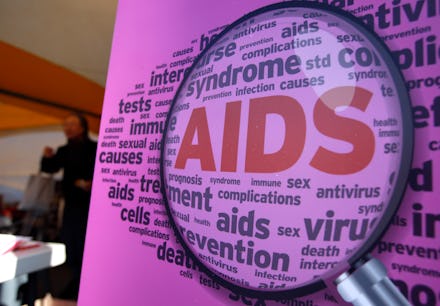One Group of People Is Acquiring HIV in Record Numbers, But We Don't Talk About Them

World AIDS Day recognizes the everyday lives and particular struggles of people around the world living with AIDS and HIV, but one population has been long overlooked. According to recent findings from the World Health Organization that analyzed data from 15 countries, transgender women are nearly 49 times more likely than the general population to contract HIV. This means that, just for being who they are, they are part of the population at highest risk for acquiring HIV.
But according to advocates, the transgender community's HIV problem remains an "invisible" epidemic, as trans women are too often ignored in health advocacy, stigmatized for their diagnosis or criminalized.
Mic spoke to the Human Rights Campaign's Noël Gordon, a senior specialist for HIV prevention and health equity, who argued that transgender women "find themselves at the eye of a perfect storm" when it comes to contracting HIV. "A number of factors are largely out of their control that push them into situations where they're more likely to encounter HIV and less likely to be able to treat it," Gordon told Mic. These factors include transphobia and poverty, as trans people are nearly four times more likely to earn less than $10,000 a year.
Employment and housing discrimination are major factors that push transgender women below the poverty level. According to statistics from the National Center for Transgender Equality, trans people face widespread bigotry both in the workplace and from landlords, as its survey indicates "26% of trans people lost a job due to bias, 50% were harassed on the job [and] 20% were evicted or denied housing." In many states in the U.S., it's still legal to fire or evict someone on the basis of sexual orientation or gender identity.
Gordon explained that without employment and housing protections, many trans women engage in survival sex work in order to support themselves. "Through no fault of her own," Gordon said, "she's been pushed into a situation where in order to support herself, she effectively has to put herself at risk for contracting HIV."
Cecilia Chung, a senior strategist for the Transgender Law Center, argued the issue isn't sex work itself but the ways in which trans women's limited options continue to be criminalized. Prostitution is outlawed in all 50 states in the U.S., except for some counties in Nevada, and in over 30 states, people living with HIV can be imprisoned for nondisclosure, according to Chung. "That means that if someone has engaged in sex work and hasn't disclosed their HIV status, they can potentially be charged with a felony," Chung told Mic.
This sends a shameful message to transgender women about what it means to be HIV positive. "The law tells us that HIV is a weapon," Chung argued. According to her, this reinforces the idea that contracting the virus is a punishment for people's behavior. Instead of recognizing the structural factors that force people into difficult situations, Chung said that we too often engage in further "shaming and blaming," furthering widespread stigma.
These damaging ideas often silence transgender women, keeping them in the closet about their status. "If I'm a transgender woman living with HIV, I [might not] want my partner to know because I fear prosecution from the police," Gordon, of the Human Rights Commission, said. "I might withhold that information or withhold it from a doctor."
But as Morgan M. Page, a trans activist working on sex work and HIV issues, explained, the threat of imprisonment isn't the only reason trans women living with HIV might not be receiving the care they need. It begins with the lack of information and resources available to trans women. "There are almost no HIV prevention materials directed at trans women, and the ones that are might not be in the right language for people who need them," Page told Mic. "There are very few available in Spanish and only two or three available in English."
According to Page, the health care system is still struggling with how to treat trans patients. "Unfortunately, a lot of physicians working today treat trans women as though we're someone else's problem," Page argued. "They don't know what to do with a trans person." According to Page, this happens because medical schools lack comprehensive education or training for trans-affirming care, which leads to a "lot of misinformation ... because doctors refuse to educate themselves."
Due to the lack of supportive doctors and health providers in too many areas of the country, "trans people have to be our own doctors and our own experts," Morgan explained. "While we do share a lot of important and valid information with each other, sometimes we perpetuate ideas that have no scientific basis, simply because there aren't any doctors there telling us that it's not true."
One of the most pervasive myths, both within the medical community and among trans women, is that you can't take hormones and HIV medication at the same time. "That's scientifically untrue," Page said. "There are only about two HIV medications you can't take hormones with, of about 30 or more that are on the market. What ends up happening is that a lot of trans women have to choose what's most important to them. And at the end of the day, many trans women are going to choose hormones over HIV medication."
But as Chung explained, many health care providers, medical professionals and researchers continue to ignore these lived realities of trans women; even the census has yet to include transgender women in the survey. "It continues to tell us that we are second class, that our lives don't matter," Chung said. "It's easy to understand why we would feel angry to be in a room where nobody acknowledges us."